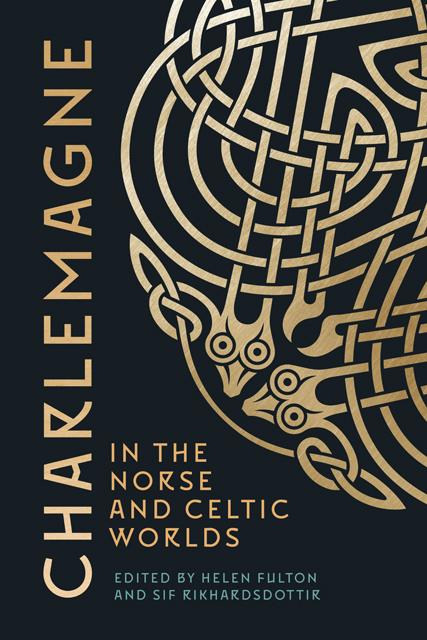Book contents
- Frontmatter
- Contents
- List of Maps and Figures
- List of Contributors
- General Preface: Charlemagne: A European Icon
- Acknowledgements
- Map
- Introduction: Transmission of Charlemagne in Scandinavia, Wales, and Ireland
- Part I The Norse Charlemagne
- Part II The Celtic Charlemagne
- Bibliography
- Index
- Bristol Studies in Medieval Cultures
1 - Transmission, Translation, and Manuscript History
Published online by Cambridge University Press: 08 June 2023
- Frontmatter
- Contents
- List of Maps and Figures
- List of Contributors
- General Preface: Charlemagne: A European Icon
- Acknowledgements
- Map
- Introduction: Transmission of Charlemagne in Scandinavia, Wales, and Ireland
- Part I The Norse Charlemagne
- Part II The Celtic Charlemagne
- Bibliography
- Index
- Bristol Studies in Medieval Cultures
Summary
The Old Norwegian Karlamagnús saga holds an important position within the Romance-Scandinavian literary relations of the Middle Ages because of its preservation of partially lost Old French chansons de geste. It thus acts as an important witness to their reconstruction. The Karlamagnús saga is a translation and compilation of different Old French chansons de geste (and in one case of the Latin Pseudo-Turpin Chronicle) into one ‘large epic compilation’ (Epische Großkompilation) whose sources are in part known and in part have been reconstituted hypothetically. Significantly, the compilation does not consist solely of chansons of the Charlemagne-group (geste du roi). Chansons of the Guillaume-group are also included. The different sources of the Karlamagnús saga, which form part of the ‘large epic compilation’, are known in many cases, although it is often impossible to determine from which versions of the chansons de geste the components of the saga originated.
For a long time, Karlamagnús saga research was mainly focused on the clarification of philological problems, especially text-critical and source-critical problems of individual branches. Narratological questions of the compilation were, however, of little interest. Branch (þáttr) VIII, Af Rúnzivals bardaga (‘Of the Battle of Roncevaux’), often referred to as Rúnzivals þáttr, has been the main focus of the research history as it represents a parallel tradition of the Chanson de Roland, and so has Branch VII about Jórsalaferð (‘The Journey to Jerusalem’). Branch III about Ogier, Branch IV – whose first part originates in the Pseudo-Turpin Chronicle – and Branch VI about Otinel/Otúel have also gathered some interest from a research historical perspective. Branch I has been a topic of controversy as well. The dispute has centred on the question of whether the branch existed independently in French before it was incorporated into the compilation or whether it was composed as a kind of overture to the whole saga. In the last two decades, research on the Karlamagnús saga has however turned increasingly towards the narrative and narratological questions of the compilation in its entirety. The impetus for this new approach was provided already in 1972 by Knud Togeby, who among other things focused on structural questions of the entire text, including the role of the disputed first branch.
Since the 1990s, the focus of Karlamagnús saga research has mainly been on narrative questions.
- Type
- Chapter
- Information
- Charlemagne in the Norse and Celtic Worlds , pp. 17 - 30Publisher: Boydell & BrewerPrint publication year: 2022



